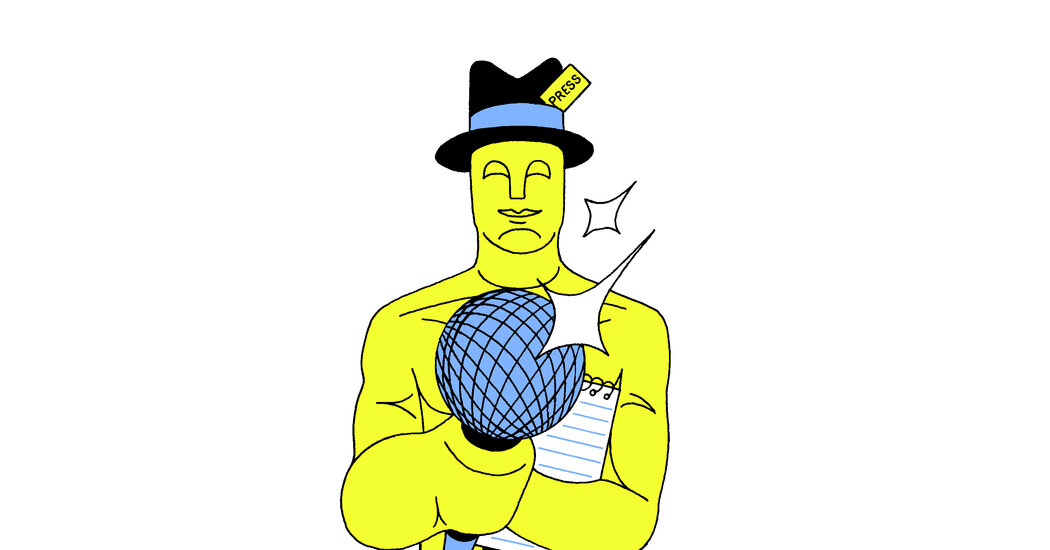Last month, Kyle Buchanan was seated at a table at the Independent Spirit Awards in Santa Monica, Calif., when, midway through the ceremony, a chant erupted outside.
Mr. Buchanan could hear the chant — “Free Palestine” — humming in the background of acceptance speeches. He exited the tent to find two protesters behind a barricade, playing the recorded chant over a bullhorn, and began filming them with his phone. Security guards soon yelled at him for filming and threatened to oust him from the premises.
Such is a day in the life of Mr. Buchanan, a pop culture reporter for The New York Times. As The Projectionist columnist, he covers Hollywood awards shows and the cultural moments unfolding both onstage and off.
Since joining The Times in 2018, Mr. Buchanan has reported from film festivals at Cannes, France, and Venice; profiled buzzy actors like Emma Stone and Da’Vine Joy Randolph; and covered more than 50 awards ceremonies.
His love of awards shows developed out of a childhood fascination. “Growing up, I was a kid with parents who had no particular affinity for indie films, foreign films or documentaries,” he said in a recent interview. “The Oscars felt like a portal into works of art that I didn’t know anything about. I was entranced.”
Ahead of the 96th Academy Awards this Sunday, Mr. Buchanan, who will be in attendance, shared his hopes for this year’s ceremony and the secret to interviewing media-trained celebrities. This interview has been edited and condensed.
Can you recall the first event you covered after joining The Times?
The first event I went to was the 2018 Toronto International Film Festival, which is one of the main way stations for Oscar contenders. That was where “Green Book” premiered, a film that eventually won best picture at the Oscars. That film set the tone for awards season coverage that year.
I think my predecessors — David Carr, Melena Ryzik and Cara Buckley — took the point of view of outsiders who parachuted into Hollywood, covering awards season as though they had landed on an alien planet. When I joined The Times, I sought to take a different approach. I wanted to tell readers why something mattered and clue them in with my insider perspective — like, why a movie that just premiered at the Toronto Film Festival could reshape an awards race. Or, the possible controversies about a film.
I like to present these behind-the-scenes machinations because they’re fascinating and can affect the way we consume movies.
How has your coverage changed over the years?
Lately, I endeavor to give readers a sense of how actors weather monthslong Oscar campaigns. They embark upon these campaigns in the fall with a lot of excitement. It’s something that a lot of them have always dreamed of being a part of, and it can advance their careers immeasurably. But the process can be exhausting.
During this awards season — maybe because the labor strike kept actors out of the press for a while — actors I’ve interviewed have been extremely thoughtful and candid with me.
You interviewed Danielle Brooks, who said that talking to you was like “therapy.” What’s the secret to getting media-trained celebrities to speak candidly?
The virtue of my job is that you get to spend a lot of time with a celebrity. Even if celebrities have their defenses up, you can simply outlast them because the conversation can last anywhere from 90 minutes to several hours. I also take great efforts to make interviews feel like conversations, not interrogations. When celebrities do a lot of short interviews, it can feel like speed dating. But if you have a real conversation with them, they start to relax and forget they are being interviewed, to some extent. I try to treat someone I’m interviewing like I would someone I met at a dinner party, like we’re getting to know each other.
What are the greatest challenges of covering awards season?
Keeping your stamina up. I don’t want to complain too much, but it is a lot more exhausting than people realize. I would also say that when it comes to predicting awards, it’s necessary to separate your own opinion on a film from your prediction. I know that there are a lot of professional pundits out there who let their dislike of a film affect whether they think it will win or not. I know that my tastes don’t always align with those of academy voters, and I try to put myself in their shoes.
What are you looking forward to most this weekend?
I hope that something emotional happens. The downside to an awards season being so long is that winners’ speeches sometimes become rote. Audiences respond to real and authentic emotional reactions. And if anyone can pull off an emotional moment, it’s people who work in Hollywood. So I hope that happens — a moment that audiences can feel a part of. That’s the sort of thing that makes you addicted to the potential of awards season.
